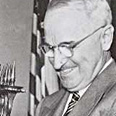
Truman's battle for Israel's recognition revealed
Washington Post columnist details 'epic struggle' in Washington over how to respond to Israel's declaration of independence on May 14, 1948. 'Beneath the surface lay unspoken but real anti-Semitism on the part of some policymakers who opposed Israel's recognition,' he says
WASHINGTON - "The epic struggle in Washington over how to respond to Israel's declaration of independence on May 14, 1948 led to the most serious disagreement President Harry Truman ever had with his secretary of state, George C. Marshall - and with most of the foreign policy establishment," Washington Post columnist Richard Holbrooke wrote on Wednesday.
Holbrooke said he had interviewed "all the living participants in that drama" 20 years ago while helping Clark Clifford, who served as a special counsel to Truman, write his memoirs.
According to Holbrooke, in March of '48 Truman privately promised Chaim Weizmann, the future president of Israel, that he would support the Jewish Agency's proposal to partition Palestinian into two parts – "only to learn the next day that the American ambassador to the United Nations had voted for UN trusteeship.
"Enraged, Truman wrote a private note on his calendar: 'The State Dept. pulled the rug from under me today. The first I know about it is what I read in the newspapers! Isn't that hell? I'm now in the position of a liar and double-crosser. I've never felt so low in my life. . . .'"Holbrooke reveals.
Holbrooke contends that "beneath the surface lay unspoken but real anti-Semitism on the part of some (but not all) policymakers. The position of those opposing recognition was simple -- oil, numbers and history.
According to the columnist's records, Defense Secretary James Forrestal told Clifford that "There are thirty million Arabs on one side and about 600,000 Jews on the other. Why don't you face up to the realities?"
'Crisis narrowly averted'
On May 12, Holbrooke says, Truman held a meeting in the Oval Office to decide the issue.
"Marshall and his deputy, Robert Lovett, made the case for delaying recognition -- and 'delay' really meant 'deny.' Truman asked his young aide, Clark Clifford, to present the case for immediate recognition. When Clifford finished, Marshall, uncharacteristically, exploded: 'I don't even know why Clifford is here. He is a domestic adviser, and this is a foreign policy matter. The only reason Clifford is here is that he is pressing a political consideration.'
"Marshall then uttered what Clifford would later call 'the most remarkable threat I ever heard anyone make directly to a President.' In an unusual top-secret memorandum Marshall wrote for the historical files after the meeting, the great general recorded his own words: 'I said bluntly that if the President were to follow Mr. Clifford's advice and if in the elections I were to vote, I would vote against the President'."
After this "stunning moment", says Holbrooke, the meeting adjourned in disarray.
"In the next two days, Clifford looked for ways to get Marshall to accept recognition. Lovett, although still opposed to recognition, finally talked a reluctant Marshall into remaining silent if Truman acted," Holbrooke writes. "With only a few hours left until midnight in Tel Aviv, Clifford told the Jewish Agency to request immediate recognition of the new state, which still lacked a name."
Truman announced recognition at 6:11 p.m. on May 14 -- 11 minutes after David Ben-Gurion's declaration of independence in Tel Aviv. Holbrooke says this was done so rapidly that in the official announcement, the typed words "Jewish State" are crossed out and replaced in Clifford's handwriting with "State of Israel."
Thus, Holbrroke says, the United States became the first nation to recognize Israel, "as Truman and Clifford wanted."
According to Holbrooke, "the secret of the Oval Office confrontation held for years, and a crisis in both domestic politics and foreign policy was narrowly averted."










